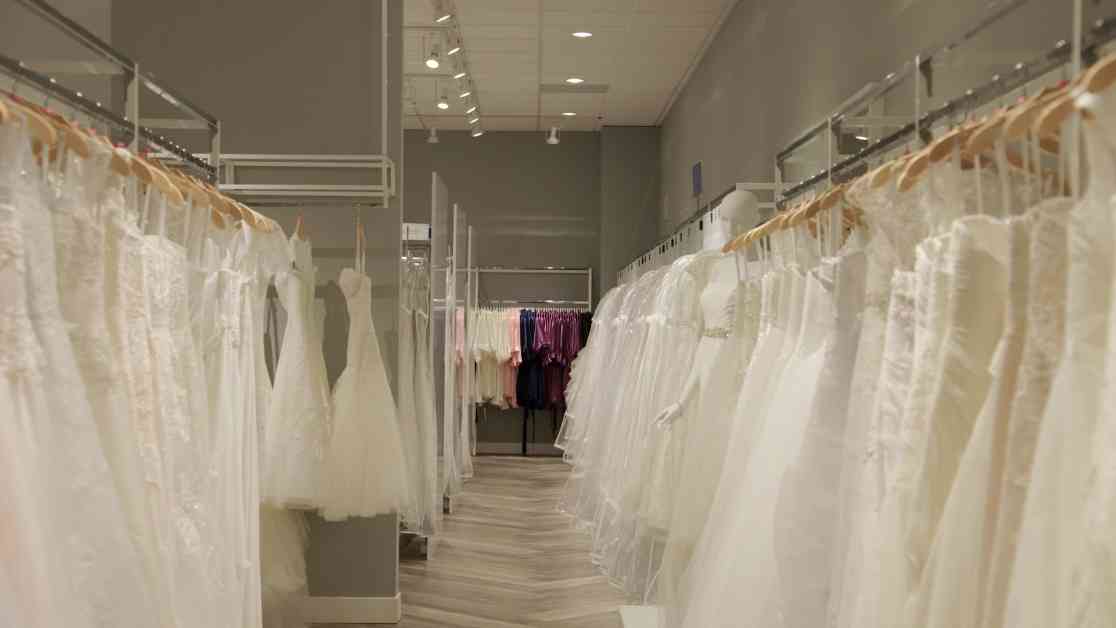Denise Buzy-Pucheu, the big boss at The Persnickety Bride, spilled the beans that hefty tariffs on stuff from China are really giving U.S. businesses, including bridal shops and wedding dress designers, a hard time. Some of the fancy brands she stocks have slapped on an extra charge thanks to the tariffs.
After President Donald Trump dropped the bomb about those steep tariffs on Chinese imports, Denise Buzy-Pucheu kicked back on the couch in her bridal boutique and whipped out the shop’s trusty ol’ iPhone. In a vid she later threw up on Instagram, the head honcho at The Persnickety Bride in Newtown, Conn. talked straight to brides and potential customers about how the whopping 145% tariff on Chinese imports is going to shake things up in the bridal biz, specifically.
Most wedding dresses are whipped up in China or other parts of Asia — and so are a bunch of the fabrics, buttons, zippers, and other doodads they use. Finding skilled seamstresses is like hunting for a needle in a haystack, and they usually come from the older crowd in the U.S. Plus, churning out the gowns in other countries where labor is cheaper has made it possible for many American families to snag top-notch bridal dresses without breaking the bank.
“These types of jobs can’t just be packed up and brought over to the United States,” she spilled in the vid. “We just don’t have the pros here to handle that.”
The tariffs on Chinese imports are landing blows on a wide range of consumer goods, from T-shirts to patio furniture to baby strollers and toys. But the bridal gown and special occasion apparel industry shines a light on how duties can mess with small businesses that are deep in the global supply chain.
Most of the sales in this space come from indie shops all around the country that carry wedding gowns, tuxedos, prom dresses, and more. They cater to customers with strict deadlines, tight budgets, and sky-high expectations, often taking custom orders placed weeks or months before the item is even made or shipped.
On top of all that, the industry is seriously feeling the squeeze from the tariffs. An estimated 90% of wedding dresses are churned out in China, according to the National Bridal Retailers Association — although more and more brands are shifting their production to other parts of Asia, like Myanmar and Vietnam. This industry group reps about 6,000 wedding and special occasion shops across the U.S.
David’s Bridal is hustling to move its production out of China pronto because of the tariffs. By July, the goal is to have all the dresses made in other countries, including Myanmar, Sri Lanka, and Vietnam.
The pain the industry is in has pushed it — along with other sectors that are taking a hit from tariffs — to beg for exceptions from the duties. In the past couple of weeks, the NBRA has kicked off a campaign urging U.S. senators and reps to convince the big shots in Washington to give them a pass. The industry is already coughing up a tariff that kicked off during the first Trump run, on top of a separate duty.
A rep for the White House didn’t get back right away with a comment on whether Trump might think about giving them a break.
Some big names in the bridal gown game have launched an online petition, including Stephen Lang, the big cheese at Trenton, N.J.-based brand Mon Cheri. Lang spilled that he’s been losing sleep over the tariffs. He’s scared they’ll tank the 120-employee company he started back in ’91 — and put a bunch of the shops that carry his dresses out of business.
A lot of those stores were already struggling to keep the lights on, cover rent, and pay employees, he said. And the boutiques are feeling the squeeze as some customers use them as a “try-on shops,” only to snatch up a similar, cheaper option online.
If shops and dress brands shut their doors for good, he spilled that it won’t just be businesses biting the dust — the tradition of hunting down garments for special occasions and family milestones will also go down the drain.
“Our industry is on the chopping block if things don’t shape up,” he said.



















